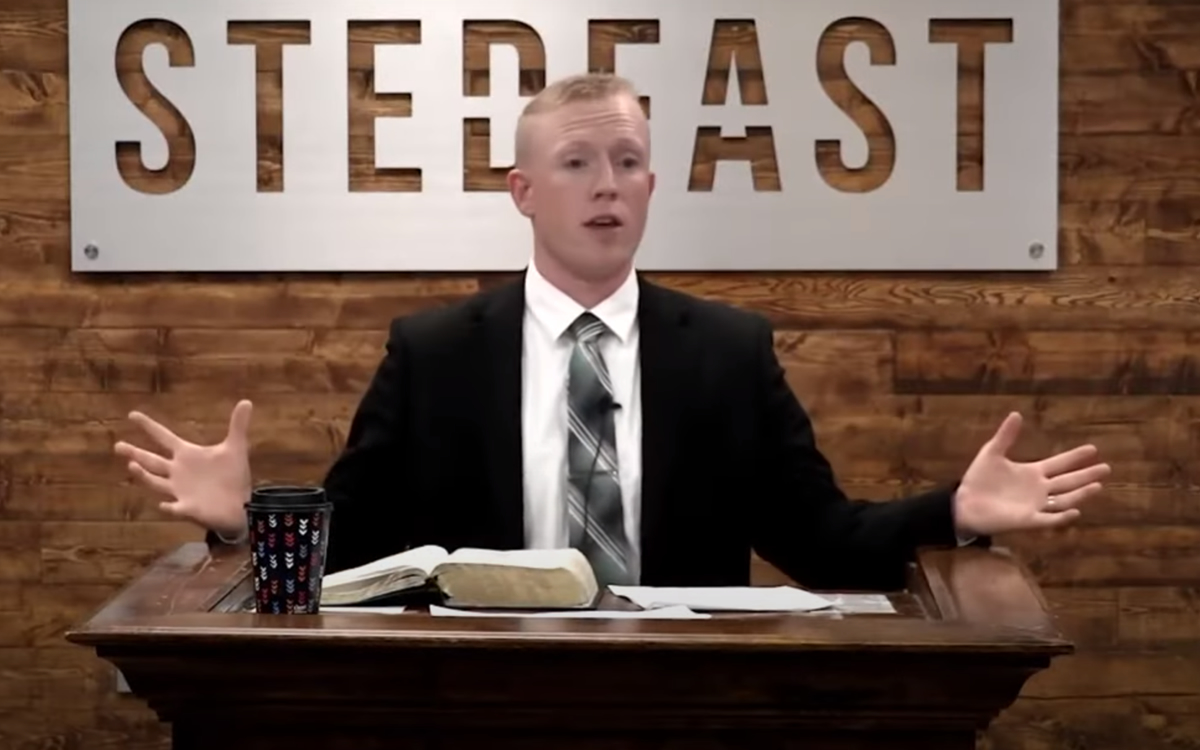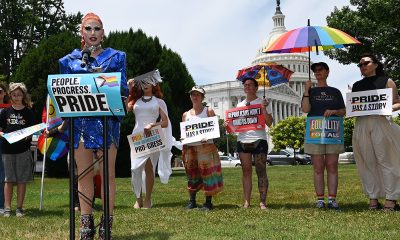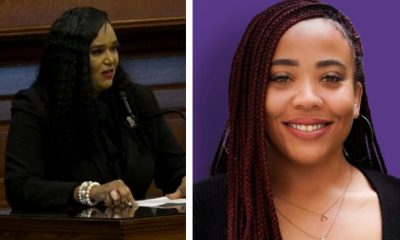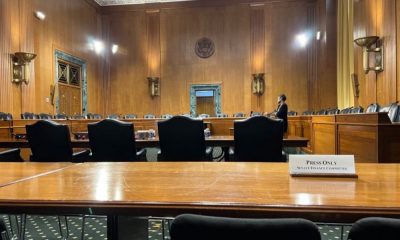Opinions
How do we respond to rising anti-LGBTQ rhetoric?
Pastor invokes Bible to call for death of gays

On Sunday, June 4, Pastor Dillon Awes stepped behind the pulpit at Steadfast Baptist Church in Watauga, Texas and declared, “What does God say is the answer, is the solution for the homosexual in 2022?…That they are worthy of death.” His statement was greeted by shouts of “Amen” from within his congregation. He continued preaching, saying, “they should be sentenced to death, they should be lined up against a wall and shot in the back of the head.” Again, his words were greeted by “Amens” from within his church.
This clip soon spread online, causing widespread backlash from religious and non-religious alike. But for me, an openly gay, former evangelical, Christian pastor, Pastor Awes’s words are not surprising at all. In fact, I’ve heard similar sentiments regularly. The only difference between Pastor Awes and most other conservative Christian pastors across the United States today is that Pastor Awes was willing to say the silent part out loud. After all, Pastor Awes was not wrong — the passage he was preaching on, as commonly interpreted by conservative Christians, does in fact say, “Although they know God’s righteous decree that those who do such things deserve death, they not only continue to do these very things but also approve of those who practice them.” (Romans 1:32) If you put any evangelical pastor on the spot and asked if they believed that this verse was true and was in reference to LGBTQ+ people, they would have to answer, even if reluctantly, “yes.”
In a strange way, I am glad Pastor Awes preached what he did so clearly, because he is revealing the truth that most other evangelicals don’t want to acknowledge — that their theology related to the LGBTQ+ community is a theology of death. Despite attempts in recent years by evangelicals to seem more welcoming and inclusive, their core theological claim that the lives and love of LGBTQ+ people is sinful, broken, and abomination is a claim that has resulted in the suffering, oppression, and death of millions of queer people around the world, and it is high time that they own up and are honest about the beliefs they hold and their impact on LGBTQ+ people. Because again, Pastor Awes view is not a minority view, as hard as that might be to believe. He simply said what a majority of evangelical churches teach in a horrifyingly clear way. While most evangelicals would probably disagree with Pastor Awes graphic call for the execution of LGBTQ+ people, the would still affirm the truthfulness of Romans 1:32: “They are worthy of death.”
And even if evangelicals attempted theological gymnastics to get out of this horrifying interpretation of scripture that calls for violence toward queer people, their theology, which tells LGBTQ+ people that they must suppress their sexuality or gender identity or seek to change it to be acceptable to God and welcome in the church does, in fact, cause death. A 2015 study published by the National Institutes of Health found that LGBTQ+ people who are subjected to non-affirming religious teachings have a significantly higher rate of attempted suicide. These numbers have been reaffirmed in study after study, and are certainly true in my experience as a young gay evangelical who was forced into conversion therapy by my Christian college in my early twenties. When you’re told that a fundamental aspect of your identity is evil and realize that there is nothing you can do to change it, for many, death can seem like the only viable escape from this mental and spiritual anguish.
So how are we to respond to the truth that this dangerous theology is being preached in literally every corner of our nation? How can those of us- religious or not- who are allies to the LGBTQ+ community protect our queer friends and family from violence and harm in the face of millions of people who hold to these dangerous beliefs and are feeling more empowered than ever to say them out loud and to act on them?
First, it’s important that we do our work and are informed. The truth is that while this interpretation of the biblical texts is unfortunately common among Christians around the world, it is not an accurate understanding of the biblical texts. The six verses in the Christian scriptures that reference any sort of same-sex behavior are all condemnations of a very particular practice that was common in the ancient world — sexual exploitation related to temple prostitution. Same-sex relationships and queer gender identities were well known throughout the ancient Near East and especially within the Roman Empire — instead of speaking about these realities, every condemnation of homosexuality in scripture is tied to “idolatry,” which means worshipping something other than God, and in context is clearly a condemnation of temple prostitution, a practice where people who have sex with priests or priestesses in pagan temples as a way to honor various gods and goddesses. That is what is being condemned in Scripture; there is not a single condemnation of same-sex relationships or queer gender identity anywhere, and we must challenge these teachings the same way we challenged the church’s teachings on slavery, the equality of women, and the panoply of other backwards beliefs that have been perpetuated in the name of Christianity.
Second, we must challenge our conservative Christian friends and family members to be honest about what they believe and the harm that it causes. The reason so many Christians shy away from saying things as clearly as Pastor Awes is because they inherently know that these beliefs are dangerous and wrong. How can one follow Jesus, whose central command was to “love your neighbor as yourself” and hold on to a belief that a group of people are abominations who are worthy of death? These are wholly inconsistent, and this inconsistency should be drawn out and turned into an invitation for our friends to change their damaging and dangerous beliefs.
Third, we must continue to uplift and celebrate LGBTQ+ people and relationships in our society. The hatred spewed by Pastor Awes is a clear reminder of why Pride is still so important — Pride celebrations began to increase visibility of queer folks, decrease stigma around our lives and loves, and to use celebration and joy as a tool for resistance in the face of fear and bigotry. Despite the broad progress the LGBTQ+ rights movement has made in the U.S., our lives and rights are consistently under attack and in the post-Trump era, there has been a reinvigoration of anti-LGBTQ+ policies and rhetoric across the nation rooted in fear being perpetuated by the alt-right. Old tropes conflating queer people with pedophilia and sexual abuse have found new life, and the demonization of LGBTQ+ people as a threat to basic morality is now commonly heard on Fox News and across social media. The way we combat such dangerous rhetoric is ensuring more people see and know LGBTQ+ people and for our allies to speak out whenever anti-LGBTQ+ rhetoric is used or policies are proposed, signaling the broad support of queer people by the American public.
During this Pride month, it’s time for a renewed commitment to the fight for LGBTQ+ dignity and equality in the United States. It’s time for queer people to stand up and let our lights shine brighter than ever before, so that LGBTQ+ youth can see our example and know that there is space for them, in all their uniqueness, in our society.
It’s time for allies to be bold in their condemnation of bigotry wherever it occurs. It’s time for our nation’s leaders to reaffirm their commitment to fight for LGBTQ+ rights in every corner of this nation and around the world. If we remain complacent, fear-based views like those of Pastor Awes will spread and will result in more abuse and violence against LGBTQ+ people. Progress is not inevitable, and the fight has not yet been won. This Pride month, may we return again to the spirit of the earliest Pride marches, standing boldly in the face of fear and bigotry and declaring that love will win in the end.
Rev. Brandan Robertson is an author, pastor, activist, and public theologian working at the intersections of spirituality, sexuality, and social renewal. He currently serves as the Lead Pastor of Metanoia Church, a digital progressive faith community.

Joe Biden was clearly ready with some facts for this debate, the sad part is he couldn’t articulate them. He sounded raspy, and lost track of what he was saying in the first few minutes of the debate. He did get better as the debate progressed but came off sounding and looking like an old man. For those of us hoping he would sound like he did at the State of the Union, or the speech he gave on anti-Semitism, it was a huge disappointment.
So, where his campaign goes from here is anyone’s guess. Behind the scenes some Democrats are calling for him to step down as the candidate. But that is much more difficult than it seems at this time. And then, will there be a fight for who the candidate will be. Will it automatically be Kamala Harris, or will it be someone else? So many unanswered questions over the next couple of weeks.
The only positive take-away for Democrats from the debate was how deranged Donald Trump sounded. He refused to deal with any issue, refused to say he would accept the results of this election, refused to acknowledge climate change, or Jan. 6, and kept saying how the states should control the issue of abortion, and women’s health. Every one of these things should be frightening to so many people. It is clear if Trump is elected, we will have a dictator in the White House, who believes Hitler did good things. His election is scary for women, young people, Black Americans, and the LGBTQ community. If states control issues related to any of these groups, they are screwed.
One of the very few good lines Biden got across was when he said 40 high-level Trump appointees, members of the Cabinet, and his vice president, have refused to endorse him as they know him best. People need to take their word for how bad he will be should he be reelected. Trump kept talking nonsense and it was hard to keep up with the lies. The moderators didn’t call him on any of it, but CNN has said before the debate they wouldn’t. But then Biden missed so many chances to call him on the garbage he was spouting. I kept hoping he would turn to him and say clearly, “You can’t believe all the BS you are spouting. You sound like a deranged six-year-old and someone who would take our country down the tubes.”
Now I accept the fact Biden speaks more slowly and softly. Though after the debate they said he had a cold. He could have said that at the beginning of the debate, if it was true, and explained his voice to the audience. And while we know he has a stutter, it seemed so much worse during the debate than it normally does. Was it nerves, maybe, but difficult nonetheless for him, and for those listening. We must have compassion for anyone with any kind of a disability. Then one had to ask, was he over-prepared for this debate? Was he so scripted he didn’t dare say anything off script. When he did, they got into this thing about golf handicaps and both sounded so childish.
Biden did manage to talk about the things he has done, and the successes of his first administration. There have been many. First bringing the country successfully out of the pandemic. He spoke about unemployment being the lowest it has been in decades, and the more than 15 million jobs created since he took office. He was honest about inflation and the fact that not all the economic successes the country is having are trickling down to every American. He understands that rents are high, and grocery bills are still too high. He made clear he wants to raise taxes on the rich and Trump wants to lower them. He had a plan to ensure Social Security would stay solvent, Trump had nothing as usual.
Finally, I was surprised that in his two-minute closing, Biden didn’t go back to the issues of abortion, climate change, and saving democracy. Did his debate prep team tell him not to? If so, they were wrong. Whether it remains Joe Biden on the ticket, or is someone else, I am 1,000% committed to do everything I can to see Democrats are elected across the board. It is clear to me, and should be to all decent people, electing Donald Trump and his MAGA Republicans, will be the end of our country as we know it today.
Peter Rosenstein is a longtime LGBTQ rights and Democratic Party activist. He writes regularly for the Blade.
Opinions
As fewer anti-LGBTQ bills pass, the fight gets harder
A growing indifference to suffering that is baked into the legal system

In recent years, advocates have faced an unprecedented avalanche of anti-LGBTQ legislation each spring. In 2024, however, the onslaught seems to have faltered somewhat. While hundreds of anti-LGBTQ bills were once again introduced, as many state legislative sessions draw to a close, fewer bills have been enacted into law.
While that may seem like cause for celebration, it’s also cause for concern.
To be sure, the slowdown in anti-LGBTQ legislation is welcome. Beginning in 2020, legislation targeting transgender rights in particular had sailed through state legislatures, with the number and scope of hostile bills increasing each year. Unlike earlier years when one or two prominent anti-LGBTQ bills triggered a national pushback that often chastened lawmakers, hundreds of bills have been introduced during legislative sessions in the last four years, often with little debate or scrutiny, and dozens of them zealously passed into law.
Those bills do real damage when they are enacted, cutting LGBTQ people off from material benefits like health care and domestic violence shelters, recognition by the state, and equal participation in public life. Even when they fail to become law, they have devastating effects on the mental health of LGBTQ people, throwing their lives into disarray and sapping valuable time and energy from LGBTQ communities. This especially affects children, with more than 90 percent of LGBTQ young people in a recent Trevor Project survey reporting that politics had negatively affected their personal well-being.
But the recent slowdown, far from being a positive signal, may well reflect a growing indifference to the suffering of LGBTQ people that is now baked into the political and legal system. Opponents of LGBTQ rights have normalized hostile rhetoric and enacted draconian laws that seemed unthinkable just a couple of years ago, and even ardent supporters of equality find themselves unsure how they might reverse state laws that unapologetically strip away LGBTQ rights.
If anything, it has become apparent that the damage that has been done since 2020 will most likely reverberate for a generation, and the past year shows that restoring and advancing LGBTQ rights will be a painstaking endeavor.
And one sobering reason for the slowing pace of anti-LGBTQ legislation is that, at this point, many conservative states have already stripped away important rights, particularly for transgender children. As of 2024, half of the states in the U.S. prohibit transgender girls from playing school sports, and half have banned or criminalized at least some forms of medically indicated healthcare.
Put differently, lawmakers aren’t targeting some rights this year because they’ve already eviscerated them.
Yet even as the pace of legislation slows, critical rights continue to be stripped away. According to the ACLU, more than 30 anti-LGBTQ bills have been enacted in 2024 — fewer than the 84 enacted in 2023, but still far too many. Among them, Utah and Mississippi restricted transgender people from accessing bathrooms and locker rooms in public schools and other government buildings.
Lawmakers in Ohio overrode the governor’s veto to ban transgender children from receiving gender-affirming care or playing sports consistent with their gender identity. South Carolina and Wyoming similarly enacted blanket bans preventing transgender children from accessing gender-affirming care.
Many of the bills that have been introduced this year sought to expand existing anti-LGBTQ legislation in new ways. Alabama, for example, successfully expanded its bathroom ban from K-12 schools to colleges and universities. Even those that didn’t pass are in many cases likely to be reintroduced after the 2024 election, particularly if anti-LGBTQ lawmakers increase their showing in state legislatures or if governors who are supportive of LGBTQ rights are no longer positioned to veto hostile legislation.
In many states with anti-LGBTQ legislation, administrative and regulatory agencies are being used to curtail LGBTQ rights even further. Florida offers an instructive example. Even after years of anti-LGBTQ legislation, the Florida Department of Highway Safety and Motor Vehicles took things a step further within its mandate, and decided in 2024 that transgender people could no longer update the gender marker on their driver’s licenses. This echoes recent regulatory crackdowns elsewhere in the United States, from the Texas Department of Family and Protective Services investigating parental support for transgender children as child abuse to school boards across the country stripping away lifesaving resources in schools.
And while many believed that courts would provide a bulwark against discriminatory legislation and regulations, in part because of strong Supreme Court precedent to suggest that anti-transgender discrimination is a form of sex discrimination, that has not consistently been the case. Trial courts have largely found in favor of transgender litigants, criticizing the insufficient justification and discriminatory purpose of anti-transgender laws, but some appellate courts have nevertheless allowed the laws to take effect.
Perhaps most alarming, there are advocates and lawmakers who, if in a position to do so, are eager to carry out an even harsher attack on LGBTQ rights. Project 2025, which a group of conservative organizations has drafted as a roadmap for a second Trump administration, promises an even more draconian attack on LGBTQ rights. This would include rolling back existing nondiscrimination protections for LGBTQ people, reinstating the transgender military ban, and codifying state restrictions on transgender rights at the federal level, in addition to limiting recognition of same-sex relationships.
The anti-LGBTQ backlash may be waning in certain respects — but in other ways, it has only just begun. As we celebrate Pride, LGBTQ people and their allies should be mindful of the need to support those communities whose rights are being eroded, invest in transgender rights organizing, demand that lawmakers prioritize LGBTQ rights, and fight for the independent institutions and protections for basic freedoms that are essential to hold power to account.
Ryan Thoreson is a specialist on LGBTQ rights at Human Rights Watch and teaches at the University of Cincinnati College of Law.
Commentary
LGBTQ people deserve freedom, a sense of home, and belonging
Latoya Nugent found refuge in Canada after fleeing Jamaica

Seven years ago, my fight for queer liberation in notoriously homophobic Jamaica culminated in a violent and brutal unlawful arrest and detention. This was the peak of decades of persecution due to my sexual orientation and work as a queer human rights defender and activist. It completely broke me and silenced me. I suffered severe emotional trauma, from which I am still recovering years later.
Following that life-threatening arrest, I became a shell of who I once was. I cut off communication with my community for several years, unable to face my fear of the police and the hostility of the world around me.
In 2022, I was one of the 9,591 at-risk LGBTQI+ people who reached out to Rainbow Railroad for help. Through the organization’s Emergency Travel Support (ETS) program, which relocates at-risk LGBTQI+ people and helps them make asylum claims in countries like the U.S., I resettled in Canada where I’ve been living safely with dignity and pride.
This Pride Month, I’m reflecting on what it means to be safe. Who has access to safety and why others are excluded from it. What is our collective role and responsibility in expanding safety for our queer and trans communities, especially those in the over 60 countries that criminalize LGBTQI+ people?
Safety means different things to different people depending on our experiences and journeys. For me, it’s the difference between suffering and thriving, feeling worthless and worthy, and feeling hopeless and hopeful. It is the difference between displacement and belonging.
Rainbow Railroad recently released a report that examines the state of global LGBTQI+ persecution, drawing on data from 15,352 help requests spanning 100+ countries. This report is significant for several reasons, chief among them is the reality that no other organization or government captures the breadth and depth of data on LGBTQI+ forced displacement, perpetuating the invisibility of queer individuals in humanitarian responses. The report is an important contribution to the discourse on the intersection of queer identity, LGBTQI+ persecution, forced displacement, and humanitarian protection systems.
Of all the data and insights uncovered in the report, I was most struck by one statistic — 91 percent of at-risk LGBTQI+ individuals relocated through the ETS program reported an improved sense of personal safety. This statistic is particularly personal to me because ETS was the only relocation option accessible to me in 2022 when I reached out to Rainbow Railroad for help.
I am in that 91 percent because I am now thriving. I feel worthy. I am hopeful about life. And I belong.
Today, among the 120 million forcibly displaced people around the world, queer and trans individuals face compounded complications from homophobia and transphobia while trying to access protection and safety. And while the anti-gender movement continues to swell in some states, I firmly believe that the U.S. remains a global leader in refugee resettlement — which is why the U.S. government must uphold its international obligations and reverse its recent executive order that imposes severe restrictions on the right to seek asylum.
Queer and trans individuals deserve freedom, a sense of home, and belonging — realities that flourish only when rooted in the bedrock of safety.
There is a lot more work to be done. It’s challenging. It’s complex. It’s costly. But I have experienced firsthand what the transformative impact of Rainbow Railroad’s work has on someone’s life — that ability to lift people out of danger into safety is something worth celebrating this Pride.
Latoya Nugent is the head of engagement for Rainbow Railroad.
-

 Canada1 day ago
Canada1 day agoToronto Pride parade cancelled after pro-Palestinian protesters disrupt it
-

 Theater5 days ago
Theater5 days agoStephen Mark Lukas makes sublime turn in ‘Funny Girl’
-

 Baltimore3 days ago
Baltimore3 days agoDespite record crowds, Baltimore Pride’s LGBTQ critics say organizers dropped the ball
-

 Sports4 days ago
Sports4 days agoHaters troll official Olympics Instagram for celebrating gay athlete and boyfriend











